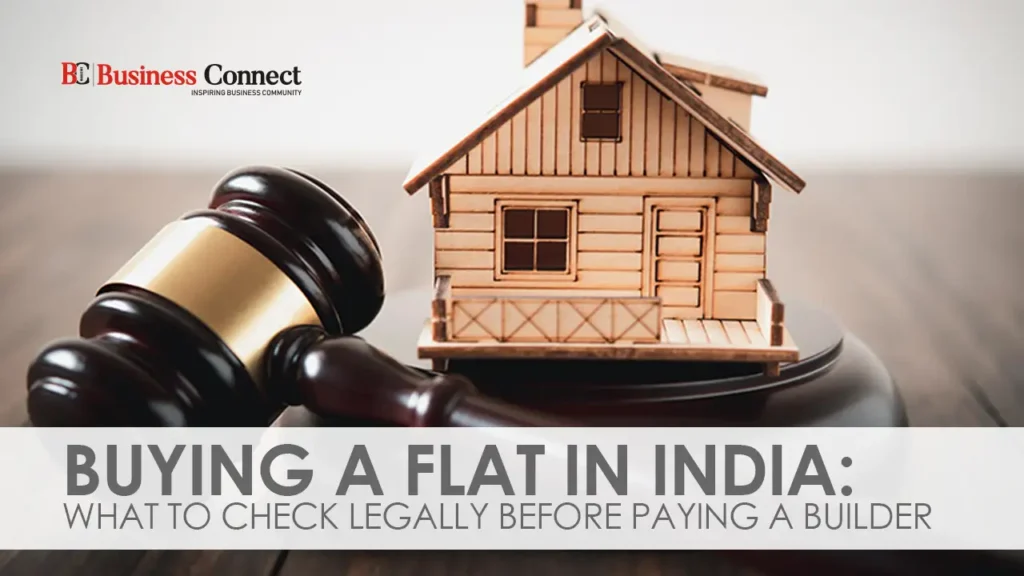Buying a Flat in India: What to Check Legally Before Paying a Builder
By Fathom Legal Advocates and Corporate Consultants
Buying a flat is one of the most significant financial and emotional investments in a person’s life. But beyond brochures, location, and builder promises, lies a critical layer—legal due diligence. Ignoring this can lead to years of litigation, financial loss, or even loss of possession. Here’s a comprehensive guide to the key legal checks every homebuyer must conduct before handing over a single rupee to a builder.
- Check RERA Registration Every real estate project (except those exempt under the Act) must be registered under the Real Estate (Regulation and Development) Act, 2016 (RERA). Visit your state’s RERA website (e.g., maharera.mahaonline.gov.in or rera.karnataka.gov.in) and enter the project’s name. The registration details will tell you:
- If the builder is authorized to sell
- Project completion timelines
- Status of approvals
- Past violations or complaints
If a project is not RERA registered, consider that a serious red flag.
- Verify Title Certificate and Legal Ownership – Ask for the Title Certificate issued by the builder’s lawyer. It should clearly state that the land on which the project is built has a clear, marketable title and is free from encumbrances. If the builder doesn’t own the land, check the Joint Development Agreement (JDA) with the landowner.
To cross-verify, conduct an independent title search through a property lawyer or at the Sub-Registrar’s office to check for:
- Ownership chain
- Pending mortgages or litigation
- Inheritance disputes or frauds
- Confirm Building Plan Approval – Builders must have approval of the layout and building plan from the local municipal authority. Ensure that the approved plan matches what is being advertised. Illegal deviations or unapproved floors can lead to demolition or denial of Occupancy Certificate later.
- Ensure OC, CC and EC Are in Order
- Occupancy Certificate (OC): Issued by municipal authorities certifying the building is fit for occupation.
- Completion Certificate (CC): Confirms the project was built as per approved plan.
- Encumbrance Certificate (EC): Lists financial liabilities (like mortgages) on the property. This can be downloaded from the state land records portal (e.g., Bhulekh, Dharani).
Never take possession without these documents.
- Review the Allotment Letter and Builder-Buyer Agreement Before paying, you will receive an Allotment Letter and then a Builder-Buyer Agreement. This is a crucial document that must include:
- Flat details (carpet area, location)
- Price breakdown
- Construction milestones
- Payment schedule
- Penalty clauses for delay
- Possession date and grace period
- Defect liability clause (usually 5 years)
Ensure this agreement is RERA-compliant. Have it reviewed by a lawyer before signing.
- Check for Past Legal Disputes – Search for the builder’s name in court databases (like ecourts.gov.in or consumerhelpline.gov.in) to see if there are past cases of:
- Fraud
- Delay in possession
- Misrepresentation
- Quality defects
Repeated litigation history is a clear sign to stay away.
- Confirm Land Use and Conversion– Ensure that the land is authorized for residential use. If agricultural land has been converted for construction, demand the conversion certificate. Construction on non-converted land is illegal and possession can be denied.
- Understand Tax and Charges– Verify if the flat price includes:
- GST (if applicable)
- Stamp duty and registration
- Development charges
- Clubhouse/parking/maintenance charges
Ambiguity in this area can lead to sudden escalations in cost.
- Check the Developer’s Track Record -Research past projects of the developer:
- Were they delivered on time?
- Any complaints from buyers?
- Quality of construction and after-sales service?
A good track record boosts your legal and financial security.
- Always Get Everything in Writing Never rely on verbal promises. Whether it’s floor rise charges, delivery timeline, or facilities promised, get it documented. Under RERA, what is in the agreement or brochure is binding.
Conclusion – In conclusion, buying a flat is not just a financial commitment but a legal one too. Skipping due diligence can expose you to serious risks—from possession delays to legal battles. By verifying approvals, reviewing documents, and consulting a lawyer early, you protect your investment and peace of mind. At Fathom Legal, we believe that a well-informed buyer is a well-protected one.



